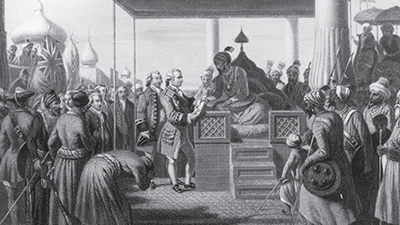Industrialization Spreads in the Period from 1750 to 1900 CE
Teacher Resources
Driving Question: How have different modes and locations of production evolved over time, and what factors have influenced these changes?
While the Industrial Revolution may have begun in Britain, it certainly didn’t stay there. The spread of industrialization had far-reaching impacts throughout the world. This lesson focuses on the impact of industrialization in different regions of the world as the Industrial Revolution spread.
Learning Objectives
- Explain how different modes and locations of production have developed and changed over time.
- Use evidence from various sources to analyze how the Industrial Revolution impacted different nations.
Vocab Terms:
- commodity
- deindustrialization
- exploitation
- famine
- social mobility
- textile
- wage laborers
Opener: Industrialization Spreads
To teach this lesson step, refer to page 2 of the Lesson 5.4 Teaching Guide.
Looking to differentiate, modify, or adapt this assignment? Check out our Differentiation Guide.
Most of the technologies in our lives were created to solve a problem of some sort. What kinds of problems did people face that led to the Industrial Revolution? How would you solve them?
The Global Transformations of the Industrial Revolution
To teach this lesson step, refer to page 3 of the Lesson 5.4 Teaching Guide.
Sometimes events that happen in one place have far-reaching effects well beyond the initial point of impact. That was most certainly the case with the Industrial Revolution, which spread from Britain around the globe.
-
Guiding Questions
-
Before you read
Preview the questions below, and then skim the article. Be sure to look at the section headings and any images.
While you read
Look for answers to these questions:
- How did the Industrial Revolution change family structures in Britain?
- What role did women and children play in the industrial economy in Britain? Did they benefit from factory labor?
- What kinds of benefits or opportunities did the Industrial Revolution create for people in Britain?
- How did the Industrial Revolution affect the daily lives and labor of people outside of Europe, such as enslaved Africans, or colonial subjects?
- In the article, the author cites historian Thomas Finger, who argued that “wheat—as much as coal—powered England’s factories.” What does he mean by this? How did wheat power England’s factories? How did the demand for wheat transform wheat-producing societies around the world?
After you read
Respond to the following questions:
- To what extent does this article explain the development of economic systems, ideologies, and institutions and how they contributed to change in the period from 1750 to 1900?
- According to the author, the changes ushered in by the Industrial Revolution had a ripple effect around the world. Using the evidence surrounding either sugar, wheat, or copper provided in the article, trace and explain one of these ripples.
- Imagine you are a new wage-laborer that recently moved from a rural farm community to an industrial city. Using information from the article, explain how your life has changed. What new hardships or opportunities might you face?
Imperialism and Deindustrialization in India
To teach this lesson step, refer to page 4 of the Lesson 5.4 Teaching Guide.
You’ve read a lot about industrialization in this unit; but what about deindustrialization? What does that mean? And how did it happen in India?
-
Guiding Questions
-
Before you read
Preview the questions below, and then skim the article. Be sure to look at the section headings and any images.
While you read
Look for answers to these questions:
- What effects did the industrialization of cotton cloth production have on the Indian economy?
- Why was deindustrialization a bad thing for India?
- What political explanations does the author give for this economic failure?
- Why did India suffer so many famines in the nineteenth century?
After you read
Respond to the following questions:
- To what extent does this article provide evidence to explain how different modes and locations of production have developed and changed over time?
- How does an event like the deindustrialization of India support, extend, or challenge what you have learned about the effects of the Industrial Revolution on economic systems?
Closer: Industrialization Spreads
To teach this lesson step, refer to page 5 of the Lesson 5.4 Teaching Guide.
Claim testing is really making and testing claims. Check out this video about claim testing in the classroom.
This activity is currently in development and will be coming soon!




